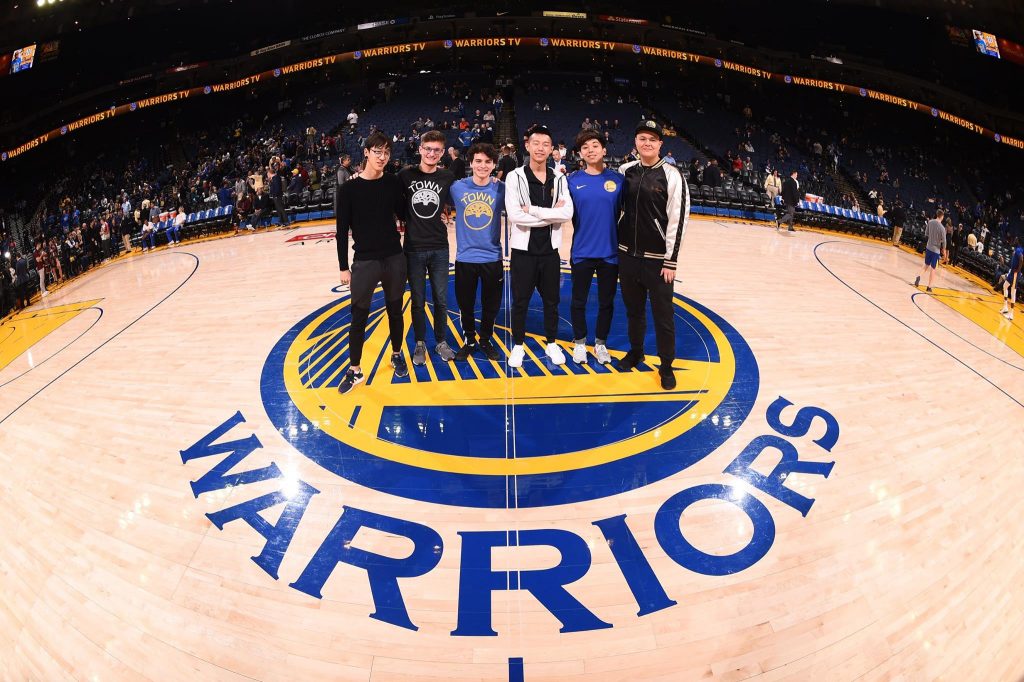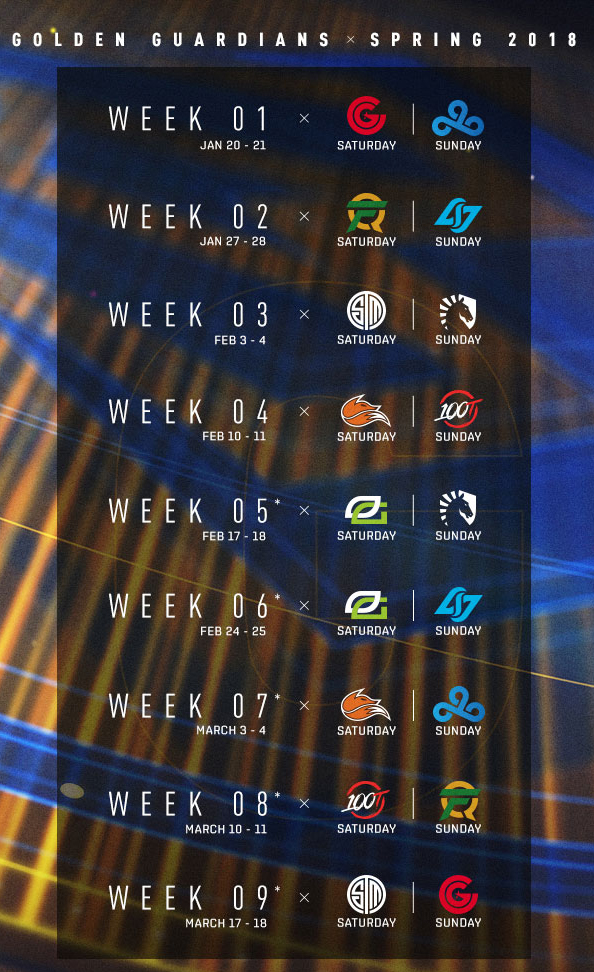Welcome to my 2018 NA LCS Spring Split Preview Series! I’ll be releasing my thoughts on each team during the 10 days before the season opener on Saturday, January 20th.
Today, another light-years ahead investment from Joe (and Kirk) Lacob: The Golden Guardians
On July 15th, 2010, an investment group led by the venture capitalist Joe Lacob bought the Golden State Warriors, a middling NBA franchise based in Oakland, California, for a then-record $450 million. It was an outlandish price point for a team that had made the playoffs only twice in the proceeding 18 seasons, and hadn’t won more than 60% of their games since 1991. Golden State had no star players, no pull for big free agents, and no chance of contending in a loaded Western Conference.
But Lacob was undeterred. “Our job is to take what we have and build,” he told The San Francisco Chronicle after the acquisition. “We’ve got a plan. We’re not going to be able to do it overnight, so I hope the fans are a little bit patient, but, as a fan, I don’t expect them to be too patient. We’re going to execute on our plan and build a winner here.”
But how do you build a winner? Lacob could have continued splashing cash and constructed a team from proven commodities in an effort to win immediately. He could have cemented 25-year-old Monta Ellis as his cornerstone and molded the Warrior’s identity around the fan-favorite shooting guard. Or he could have turned the team entirely over to management, leaving the building to better minds.
In the end, Lacob did none of those things. In a model that the rest of the NBA (and American professional sports) would eventually race to emulate, Lacob chose to build from within, eschewing a “win now” mentality in favor of slow, steady progress that focused on developing talented young players.
He took a chance on Stephen Curry, the second-year point guard whose fragile ankles made some question whether his career would ever take off. With advice from General Manager Bob Myers and NBA legend Jerry West, Lacob shrewdly drafted Klay Thompson in 2011 and Draymond Green in 2012. He surrounded these young players with cheap, supportive veterans like David Lee, Andrew Bogut, and Andre Iguodala, while getting rid of ball-dominant players like Ellis, whose style would inhibit the growth of young shooters like Curry and Thompson.
For a while, the Warriors were bad, but that was part of the plan. Youth takes time to develop, and though fans loudly decried the exiling of Ellis, they came around once it became clear that the triumvirate of Curry, Thompson, and Green had the potential to be special. By the 2012-2013 season, the Warriors were back in the playoffs and the Splash Brothers were setting records. Golden State would win the NBA title in 2015 (their first since 1975), set a new league record for wins in 2016, and, with the addition of superstar Kevin Durant, win a second championship in 2017. They remain title favorites this year, and it’s not particularly close. According to Forbes, the Warriors are now worth $2.6 billion, third-highest in the NBA.
Which brings us, in a roundabout way, to the Golden Guardians. There is every indication that the Lacob Family’s primary venture in esports (hopefully the conflicts end soon) will follow the same philosophy they used to succeed in the NBA: Build through homegrown youth surrounded by amiable veterans. Develop now, win later.
The roster Kirk Lacob (Joe’s son) has constructed with Head of Esports Hunter Leigh and Head Coach Choi “Locodoco” Yoon-seop is defined by youth and potential. They might not be good now, but that’s not the point.
“We believe we wanted to build something with a lot of upside, people with a lot of untapped potential,” Kirk Lacob told Blitz Esports last year. “We could have gone and gotten a bunch of mercenaries, people who cared about winning right now and nothing else and their own personal brand and their legacy. Instead, we really focused on people we thought wanted to be here, wanted to be part of building something.”
Golden Guardians will become only the third NA LCS team to field an All-North American roster since the introduction of import restrictions in Season 5, and mid laner Hai “Hai” Du Lam has been on two of them. Gone are the days Hai could carry teams to Worlds—though FlyQuest’s upset of Team Dignitas in last year’s regional quarterfinals certainly woke up some echoes—but that’s not why he’s here. At 25, Hai is by far the oldest GGS starter (next is AD carry Matthew “Deftly” Chen at 20), but his experience and reputation as a shotcaller will be invaluable to a team (and organization) eager to learn and humble enough to admit their ignorance. Hai might not be the long-term solution for GGS at mid, but expect to see him involved in the organization past his playing days, helping mentor the next generation.
And what a generation it could be. If you’re searching for a Curry analogous, look no further than Hai’s former Cloud9 Academy jungler Juan “Contractz” Garcia. Contractz is coming off one of the most impressive rookie seasons in NA LCS history, winning Rookie of the Split for C9 in spring and forming a potent enough mid-jungle synergy with Nicolaj “Jensen” Jensen to advance to the quarterfinals of Worlds 2017. At his best, he’s outclassed every jungler in NA LCS, and gained international recognition with wins over luminaries like Ming “Clearlove7” Kai and Xiang “Condi” Ren-Jie. With the meta shifting in favor of carry junglers, plus his familiarity with Hai, count the 18-year-old Contractz as a GGS fixture for years to come.
Contractz is the youngest starter for GGS, but Deftly is the team’s only rookie entering Spring 2018. The former eUnited marksman and Scouting Grounds product, Deftly will finally get his LCS shot while filling one of the most mechanically demanding positions in League of Legends. He’s looked confident in NACS play but at sea once faced with LCS bot lanes; he went 1-9 against them through the final two promotion tournaments. Now the competition is raised, but are the stakes? For a long-term thinking team like GGS, I doubt they’ll measure Deftly’s growth in wins or losses. Simply getting to play regularly at this level, surrounded by helpful veterans, will dramatically accelerate his growth.
Rounding out the starting lineup are two former Team Liquid stalwarts: top laner Samson “Lourlo” Jackson and support Matthew “Matt” Elento. Their reunion with Locodoco is less an attempt to right the wrongs of Breaking Point, and more a furthering of growth together absent the distraction of toxic personalities. Lourlo and Matt showed glimmers of impressive macro in an otherwise dismal Season 7 where they were relegated twice. It’ll be interesting to chart their improvement given a new, positive environment with less immediate pressure to succeed.
Despite having the potential to be one of the stronger organizations in NA LCS, this iteration of GGS shouldn’t be expected to win much in Spring 2018. An uncertain bot lane is a glaring weakness, though Contractz and Hai have a ceiling that should keep GGS in games, if not surprise teams entirely. Keep an eye on the development of Deftly as a barometer of success; if he’s popping off every game, the Golden Guardians could ascend to Golden State Warrior-levels of relevancy sooner rather than later.
Golden Guardians Academy Squad:
Top: Thomas “Jenkins” Tran
Jungle: Nicholas “Potluck” Pollack
Mid: Boyuan “bobqin” Qin
AD Carry: Robert “Jurassiq” Mabansag
Support: Alex “Xpecial” Chu
Coach: Tanner “Zeu” Deegan
Tomorrow, the GREENWALL comes to NA LCS…


